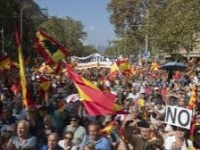Politics
Is Spain in danger of dismantling?
Some political decisions make him fear
USPA NEWS -
Spain is the oldest country in Europe, a world leader in the 16th century when its possessions extended throughout Europe, America and Asia. Throughout its history, it has gone through turbulent periods - fundamentally, wars and social transformations - and calmer ones from which it has always managed to emerge successfully. Today, however, a fear spreads through the Spanish streets: that the oldest country in Europe will fragment and disappear or, at least, transform into a new, smaller Spain with less population.
A fear that began to spread in 2016, when Catalan nationalist parties began to talk about independence. The ghost of what happened in the Balkans in the early 90s of the 20th century settled among the Spaniards, increased when in 2017 the regional government of Catalonia unilaterally declared its independence. The quick reaction of the Spanish Government, then chaired by the conservative Mariano Rajoy, which suspended Catalan autonomy and ordered the arrest of the leaders of the secessionist attempt, stifled the separatist attempt. More than a hundred people were tried and convicted, but the head of the regional government of Catalonia, Carles Puigdemont, fled Spain to take refuge in Belgium. The courts of the European capital rejected the arrest warrants for the former Catalan president, who has since lived in voluntary exile.
The fear of the Spanish Government was that, after the Catalans, secessionist desires would spread to other regions such as the Basque Country or Galicia. It did not happen, although, especially in the Basque Country, the independence movement has a not inconsiderable social mass that supports it. On October 25, 2003, the Basque regional government, then chaired by Juan José Ibarretxe, presented a project to reform the Statute of Autonomy of the Basque Country, based on three pillars: 1. The Basque people are a people of Europe with their own identity. 2. The right of the Basque people to decide their future; that is, to hold a referendum on its independence, and 3. The decisions of each region of the Basque Country - the three Basque provinces, Navarra and the French Basque Country - must be respected by the others and by the rest of the peoples of Europe. But the Basque proposal did not seek, as the Catalan one does now, confrontation with the Spanish State. The Basque government presented its project to the Spanish Parliament, which rejected it by an overwhelming majority: 313 votes against, 29 in favor and two abstentions.
Almost two decades later, the situation has changed: the Catalan leaders do not mind confronting the Spanish Government with all the means at their disposal, taking advantage of its weakness. The 2019 legislative elections left a very fragmented Spanish Parliament, without a clear majority that would allow it to govern alone. The Socialist Party, winner of those elections, sought the support of the extreme left, offering Podemos several ministries; and that of the Catalan and Basque nationalist parties. The elections of July 23 did not clarify the situation. Still without a Government and after the parliamentary rejection of the winner of the elections, the conservative Popular Party, it is time for the Socialist Party. The candidate for re-election, the acting Prime Minister, Pedro Sánchez, will present himself for the investiture in the coming weeks.
To do this, he is negotiating with all parliamentary groups, except with the extreme right represented in Vox. These include Bildu, the Basque group heir to the terrorist organization ETA. And also to the republican left of Catalonia and the independentist Junts per Catalunya. The latter demand that the socialists approve an amnesty law that comes into force before the investiture and that allows the return to Spain of their leader, Carles Puigdemont, free of charge. They also demand the approval of another law that allows the holding of a referendum on the independence of Catalonia.
For weeks, acting Prime Minister Pedro Sánchez has remained silent on the amnesty. According to legal experts consulted by USPA News, there is a fundamental difference between amnesty and pardon. The pardon implies the forgiveness of a convicted person, while the amnesty - they maintain - implies a recognition that the courts acted unjustly in condemning the independence leaders and that the laws were wrong. And this detail is what pits the right-wing parties against the Socialist Party, the extreme left and the Catalan and Basque nationalist and independence parties.
During the celebration of the European Summit on October 5 and 6 in Granada, Pedro Sánchez publicly admitted, for the first time, that the amnesty is on the Government's table and is included in the negotiations with the Catalan parties. The acting Prime Minister also said this to his European counterparts. It is “a way of trying to overcome the judicial consequences of one of the worst crises in the history of democracy,” he explained to the participants in the European Summit. But he refused to confirm whether the Socialist Party will accept the independence demands if Pedro Sánchez's investiture depends on them.
From the pro-independence ranks, the president of the regional government of Catalonia, Pere Aragonés, never tires of repeating that the amnesty will finally be approved. This Monday, he publicly noted that negotiations with the Socialist Party are very advanced. And, like the socialist leaders, he tried to discredit the large demonstration that, on Sunday, filled the streets of Barcelona with cries of “Amnesty, no!”, “Neither amnesty nor self-determination” and “In my name, no!.” 300,000 people, according to the organizers, and 50,000 according to the Catalan Police.
This Monday, from the conservative ranks, it was warned that the amnesty “does not bury self-determination” but rather promotes it. And this is the fear of the Spanish people: that, because of the personal ambition of the Prime Minister, Spain will disintegrate. The danger, legal experts consulted by USPA News warn, exists. Because, after Catalonia, the Basque Country would become independent and, probably, also Galicia and other regions.
Liability for this article lies with the author, who also holds the copyright. Editorial content from USPA may be quoted on other websites as long as the quote comprises no more than 5% of the entire text, is marked as such and the source is named (via hyperlink).







